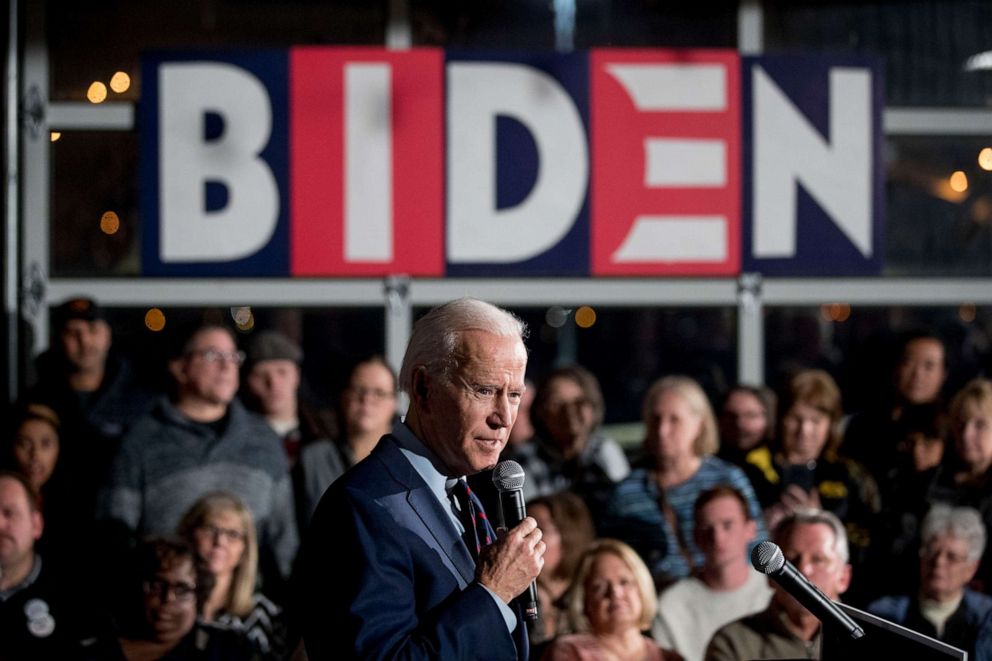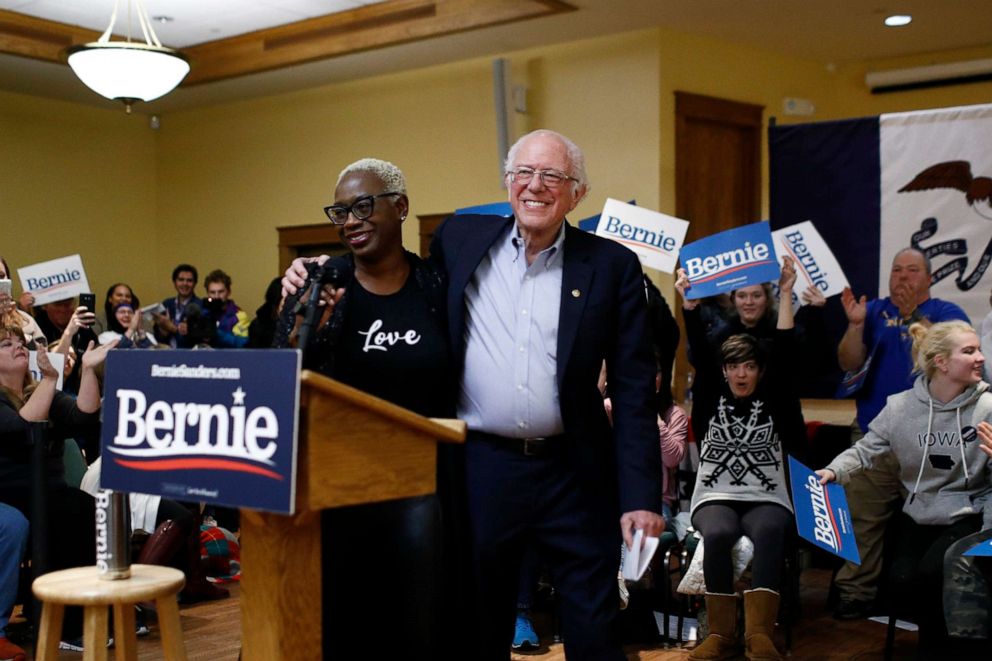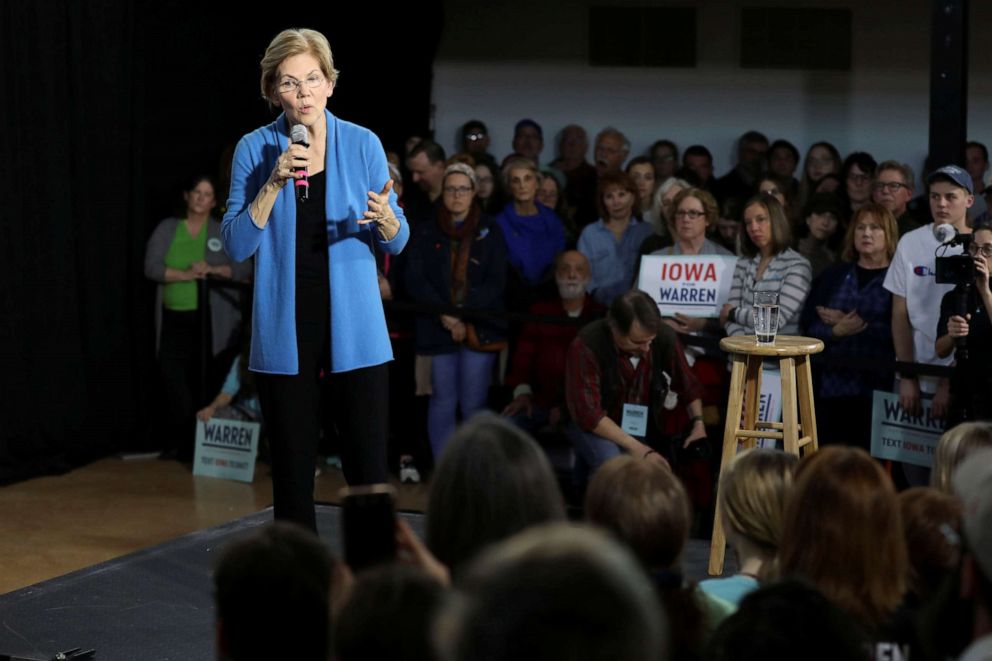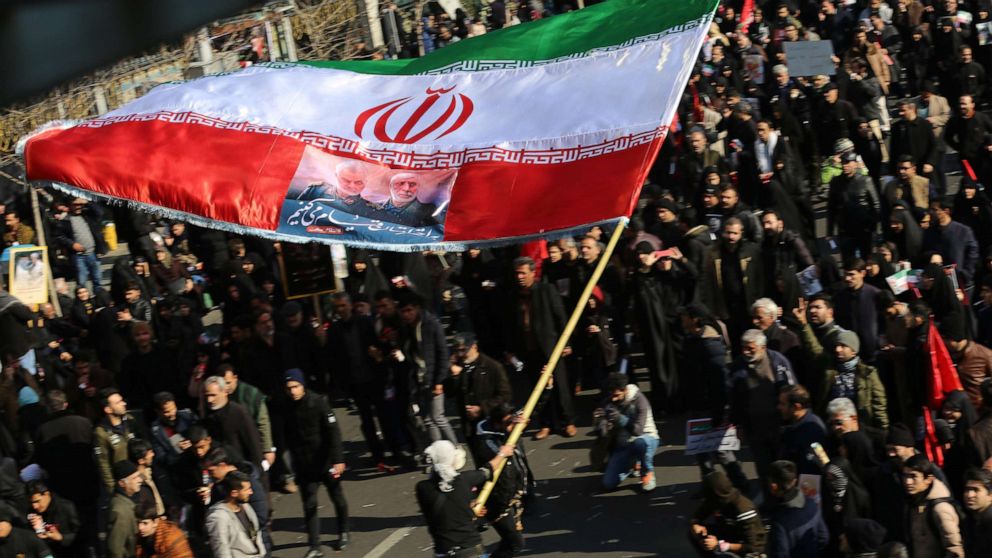2020 Democrats look to step into commander-in-chief role amid intensifying Iran crisis
The U.S. strike killing Iran’s top military general sparked a sudden inflection point in the 2020 presidential primary, bringing to the forefront one of the first auditions of the cycle for the Democratic hopefuls to not only be seen as a candidate and a possible leader of the free world, but as the commander-in-chief amid a foreign policy turn.
With the sudden entrance of a potential national security crisis into the contest, the Democratic contenders are drawing "revealing" distinctions as they articulate their vision for U.S. leadership abroad.
"The differences in how they've spoken about [the strike] are revealing," Jonathan Tepperman, editor-in-chief of Foreign Policy Magazine, told ABC News. "They've been universal in their criticism, but what they criticize it for has differed."
Former Vice President Joe Biden continued his multi-day drumbeat against President Donald Trump's foreign policy platform with a forceful rebuke of the Republican incumbent on Tuesday. Biden used the opportunity to directly address Trump, seeking to elevate his potential presidential leadership against the current commander-in-chief -- calling him "dangerously incompetent" -- and to argue he is best-suited to assume the presidency on day one.
"I have no illusions about Iran. The regime has long sponsored terrorism and threatened our interests. It continues to detain American citizens. They’ve ruthlessly killed hundreds of protesters, and they should be held accountable for their actions," he said in a foreign policy address in New York City. "But there is a smart way to counter them -- to counter Iran -- and a self-defeating way. Trump’s approach is demonstrably the latter."
Throughout the weekend on the trail, Biden leaned into his "sober approach to foreign policy" based on decades of experience with international affairs, Tepperman said, threading his time as chairman of the Senate Foreign Relations committee and as vice president into his stump speech to contrast himself with Trump's "impulsive" nature.
"All this just reinforces the stakes of this election in my view," he said in Des Moines, Iowa on Sunday. "That's why it's so important to elect someone who is already ready on day one. When they are elected, to pick up the pieces -- to pick up the pieces of this disarray and immediately be commander-and-chief of our armed forces."

Biden’s argument was also reinforced by the endorsement of a trio of military veterans -- Reps. Conor Lamb, D-Penn., Elaine Luria, D-Va., and Chrissy Houlahan, D-Penn., -- on Sunday, who also represent three Democrats who flipped red districts to blue in 2018 in crucial battleground states.
Arguably, no two candidates more than Biden and Vermont Sen. Bernie Sanders exemplified the fractures in the primary, based on clear differences in philosophy about the direction of American foreign policy in a post-Trump era, political experts said.
"The conflict with Iran enables both Biden and Sanders to play to their strengths," said Larry Sabato, director of the University of Virginia Center for Politics. "Biden has a long and deep portfolio of experience on foreign policy that reinforces his claim that he’s ready to be president. Iran has brought foreign policy to the forefront, which ought to help Biden. But Sanders gets to play one of his best cards. While Biden voted for the Iraq War, Sanders opposed it, giving him the argument that he has better judgment. Many liberals in the party have never forgiven Biden, like Hillary Clinton, for the Iraq vote."
But the former Delaware senator’s lengthy record also has left him open to criticism from his political rivals, particularly, as Sabato notes, his support for the 2003 invasion of Iraq. Biden has since called his 2002 vote to authorize the Iraq War "bad judgement" for trusting former President George W. Bush at the time for saying "he was only doing this to get inspectors in."
His vote is one that Sanders repeatedly invokes to contrast himself with Biden and underscore his long-standing credentials as a "dove," someone who tends to be more averse to the use of military force. Sanders did, in fact, vote for the 2001 invasion of Afghanistan, but he, too, recently conceded at the December Democratic debate that he was "wrong."
"He brings into this campaign a record which is so weak that it just cannot create the kind of excitement and energy that is going to be needed to defeat Donald Trump," Sanders said of Biden in an interview with the Washington Post last week.
On Monday, Sanders again knocked Biden's voting record, telling CNN the former vice president "helped lead the effort for the war in Iraq, the most dangerous foreign policy blunder in the modern history of this country," before adding, "You think that's going to play well in Michigan or Wisconsin or Pennsylvania?"
In calling attention to Biden’s Iraq War vote, Sanders implicitly highlights his own staunch opposition to war, stemming back to his aversion to the Vietnam War. On the campaign trail, he often uses the key difference as the most significant example of his commitment to a foreign policy agenda focused first and foremost on diplomatic efforts.
"It gives me no pleasure to tell you that at this moment we face a similar crossroads fraught with danger. Once again, we must worry about unintended consequences and the impact of unilateral decision making. And let me repeat a -- a warning, I gave in 2002 during the debate over the war in Iraq," he said in Anamosa, Iowa on Friday. "This is what I said back then, 'War must be the last recourse in our international relations. And as a caring nation, we must do everything we can to prevent the horrible suffering that a war will cause.'"
Sanders reiterated his stance during an interview with CNN Monday, calling the attack an assassination and saying, "once you start this business of a major country saying, 'Hey we have the right to assassinate,' then you're unleashing international anarchy."
The differences in Biden’s and Sanders’ approaches to foreign policy reflects perhaps the clearest contrast between the two front-runners, but it also highlights one key similarity between the two: their comfort with assuming the role of commander-in-chief.

"I think Biden quickly referred to his own experience and confidence in handling a moment like this," Julian Zelizer, a professor of history and public affairs at Princeton University, told ABC News. "People watch that, again, it's not simply the substance -- because I’m not sure everyone follows -- but just imagine if he was the one at the podium explaining how this is going to be done."
In calling for a "more wholesale rethinking of policies in the Middle East," Zelizer said, "Sanders, for Sanders fans, his response will also be exciting. He instantly thinks big and says, we have a bigger problem here. That boldness is what his supporters like."
"The substance certainly matters, but there's also something about the way they deliberate in public, the way they handle the crisis in real time, that is going to be very important," Zelizer continued, speaking more broadly of the field at large. "It's watching them in the middle of a crisis and imagining as they were the president."
Though Sen. Elizabeth Warren of Massachusetts was among the first to respond as news of the strike broke, she swiftly drew heat from both the left and right - calling him a "murderer," and getting criticized both for vilifying him, rather than decrying escalation in the Middle East - and for not vilifying him enough.
Progressive supporters backing Warren were uncomfortable with her initial response, upset with its centrist thrust and dearth of the "big, bold, structural" stances that won them to her side, multiple sources told ABC News. By the next day, her rhetoric showed a clear U-turn: calling the strike an "assassination," as Sanders had already done.
By Tuesday, when pressed by ABC's "This View" co-host Meghan McCain about the "flip-flop," Warren said, "This isn’t a change -- the question is what is the response the president of the United States should make."
"Having killed Soleimani does not make America safer," she told the hosts during the appearance, continuing an ongoing critique of Trump. "He has moved us close to the edge of war."
But Warren was not the only top-tier candidate to shift her tone: Pete Buttigieg, a former U.S. Navy intelligence officer and mayor of South Bend, Ind., walked back his characterization of the strike against Soleimani as an "assassination," despite doing so just the night before -- saying he’s "not interested in terminology."

In this crucial test for the field of Democrats asking for America’s vote, however -- words become the currency of promised action, underscoring stance; fluctuating rhetoric erodes strength of message in a moment when, experts say, that’s key.
"If this keeps unraveling, if this gets scarier, you know, attacks are happening, Mayor Pete might look that much younger," Zelizer said. "And voters might be that much less comfortable with him, not because of his substance or not even because he somehow couldn't handle this, but he just looks like he might not be able to and then that could hurt in a campaign. He has to overcome that with a lot of gravitas."
Zelizer added - it’s not a simple matter of age -- one of the most senior people in the race, he notes, is "the most gaffe-ridden candidate." Moreover -- it’s not a pure question of one 'right' ideology, but rather, of demonstrating a firm hand at the helm during turbulent times.
"I think Senator Warren got in some trouble right away," Zelizer said. "That kind of her position changed based on criticism and push back, and it wasn't necessarily the substance as much as her doing that, I think kind of undermined some of the authority she could bring on a question like this."
"Voters want to see a certain steadiness about how the candidates handle this," he added.
The unique test of foreign policy
While President Trump contends with mounting blowback and dramatic ramifications over authorizing a drone strike against Qassem Soleimani -- the second most important official in Iran's government behind Ayatollah Khamenei -- the move marked a major escalation in months of tension between the U.S. and Iran.
For the Democratic presidential candidates, confronting a foreign policy test brings some of the most unique set of challenges to a still unsettled contest that has been dominated by domestic policy.
"Foreign policy has been neglected in presidential politics," said Andrew Bacevich, a professor emeritus of history and international relations at Boston University, the president of the Quincy Institute for Responsible Statecraft, and the author of The Age of Illusions: How America Squandered Its Cold War Victory. "In the present moment, there is significant fear about the possibility of the United States being involved in a major war another major war."
But with less than a month until early voting gets underway with February’s Iowa caucuses, this critical moment, Bacevich said, "could well offer a candidate an opportunity to distinguish himself or herself from all the other Democrats on that crowded stage."
Unlike pocketbook issues or questions over health care, foreign policy relies on an ability to quickly lead by instinct, experts say.
"If you ask yourself, who's gonna give me the best health care plan for the nation, that's a question of a whole different order," Bacevich told ABC News.
"It's one that doesn't center on a capacity to make sound judgments matters of great importance in a short span of time," he continued, before posing, "Is this is a person who we will trust to make the right decision on matters of war and peace?"
ABC News' Molly Nagle, John Verhovek and Adam Kelsey contributed reporting.




